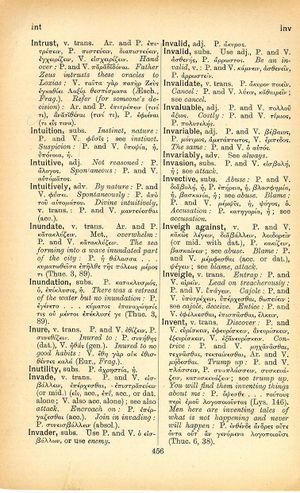inveigh against: Difference between revisions
From LSJ
οὐ δικαίως θάνατον ἔχθουσιν βροτοί, ὅσπερ μέγιστον ῥῦμα τῶν πολλῶν κακῶν → unjustly men hate death, which is the greatest defence against their many ills | men are not right in hating death, which is the greatest succour from our many ills
(Woodhouse 3) |
(CSV4) |
||
| Line 1: | Line 1: | ||
{{ | {{Woodhouse1 | ||
| | |Text=[[File:woodhouse_456.jpg|thumb|link={{filepath:woodhouse_456.jpg}}]]'''v.''' | ||
P. and V. κακῶς [[λέγω|λέγειν]], [[διαβάλλω|διαβάλλειν]], λοιδορεῖν (or mid. with dat.), P. κακίζειν, βασκαίνειν; see [[abuse]]. | |||
<b class="b2">Blame</b>: P. and V. μέμφεσθαι (acc. or dat.), ψέγειν; see [[blame]], [[attack]]. | |||
}} | }} | ||
Revision as of 09:44, 21 July 2017
English > Greek (Woodhouse)
v.
P. and V. κακῶς λέγειν, διαβάλλειν, λοιδορεῖν (or mid. with dat.), P. κακίζειν, βασκαίνειν; see abuse. Blame: P. and V. μέμφεσθαι (acc. or dat.), ψέγειν; see blame, attack.

